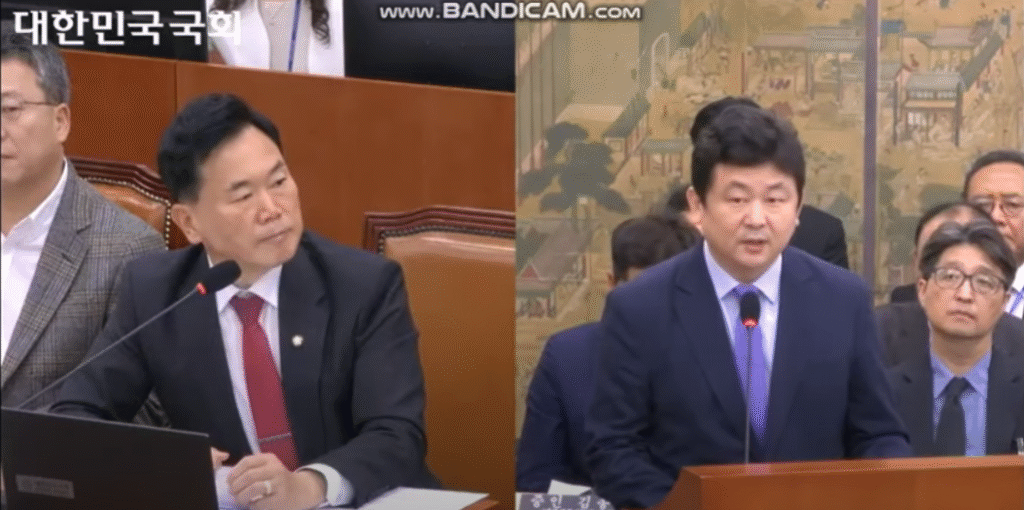
On October 24, 2024, Rep. Kim Seung-soo (Daegu Buk-gu Eul) joined VANK Director Park Ki-tae at the National Assembly’s Culture, Sports, and Tourism Committee audit to address global distortions of Korean history and underscore the importance of VANK’s initiatives to promote accurate knowledge of Korea worldwide.
During the comprehensive audit of the Ministry of Culture, Sports, and Tourism, Rep. Kim praised VANK for its more than 20 years of work investigating and correcting inaccurate depictions of Korea in textbooks, world maps, websites, museums, and art institutions, emphasizing the organization’s role in promoting Korea’s history and culture correctly.
In response to questions regarding VANK’s recent achievements, Director Park highlighted a notable case in which university students involved with VANK corrected errors about Korea in the essential “Korea” textbook used by Harvard Business School.
VANK nurtures Korean youth as digital diplomats and global Korea ambassadors—not as formal government officials—to proactively correct errors in textbooks, educational institutions, museums, and map websites, and to register Korea’s rich heritage accurately worldwide.
When asked about challenges faced by VANK, Director Park explained, “Correcting international errors requires close cooperation between a private organization like VANK and government agencies, which has not been fully realized. Relevant government departments tend to hesitate because addressing historical distortions invites criticism, and active intervention is difficult. Despite the global Hallyu wave and increased interest in Korean tourism, guidebooks from publishers such as Lonely Planet and Insight Guides still contain uncorrected errors.”
Director Park also expressed concern about China’s evolving role in historical distortions: “Whereas in the past, the Chinese government secretly drove historical distortions, now private actors in China are spreading misinformation about Korea, including cultural distortions involving hanbok, bibimbap, and kimchi.”
Rep. Kim further raised issues not only with errors in foreign textbooks but also with distortions found in teaching materials published by the Sejong Institute, operated by the Ministry of Culture, Sports, and Tourism.
With the global Hallyu wave fueling interest in learning Korean, the Sejong Institute currently operates 256 branches in 88 countries, serving over 1.06 million learners. The institute’s textbooks are widely used and popular in Korean language education and also include Korean culture and history content.
Despite this influence, investigations revealed that most Korean maps in Sejong Institute textbooks omit the labeling of Dokdo and the East Sea. Rep. Kim questioned Minister Yoo In-chon about the serious implications of this omission, emphasizing the institute’s responsibility to inform the international community accurately.
Minister Yoo acknowledged the issue, stating, “It is difficult to understand why Ulleungdo and Dokdo are repeatedly omitted on maps, but it appears to be due to oversight. We recognize the important role of VANK and will work to correct these errors through public-private cooperation.”
Rep. Kim asked Director Park why historical distortions persist, and Park replied, “Government agencies lack the will to actively collaborate with VANK to correct errors and promote Korea globally. Distortions now appear worldwide in materials ranging from kindergarten to university textbooks, tourism guides, history books, museums, and art institutions. Current government responses are fragmented, highlighting the need for a dedicated cross-government organization to respond effectively.”
Rep. Kim suggested establishing a joint committee for government agencies and VANK to respond to neighboring countries’ historical distortions, emphasizing that the Ministry of Culture, Sports, and Tourism should take more responsibility in this matter.
Finally, Director Park addressed Minister Yoo, stating, “With over 200 million Hallyu fans worldwide, the Korean government proudly uses Hallyu as a national promotion strategy. However, the interest generated by Hallyu could lead to misinformation about Korea in global textbooks, encyclopedias, and tourism publications. Before distorted information from China and Japan spreads, Korea must proactively provide accurate information to Hallyu fans and cultivate them as global ambassadors.”
VANK and Rep. Kim agreed on the necessity of spreading correct information on Korean territory, history, and culture across websites and textbooks worldwide to safeguard Korea’s digital sovereignty and reinforce awareness of territorial integrity in the digital domain.
They also discussed creating an intergovernmental task force to address historical distortions and enable proactive government-led Korea promotion.
Meanwhile, VANK has actively petitioned to correct Sejong Institute textbooks omitting Dokdo and the East Sea through its national policy platform, Woollim, emphasizing the need for immediate rectification.